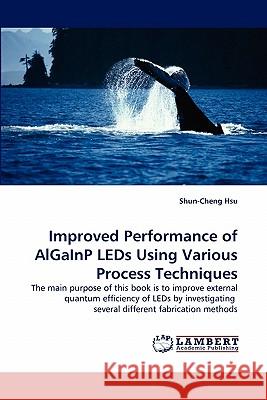Improved Performance of AlGaInP LEDs Using Various Process Techniques » książka
Improved Performance of AlGaInP LEDs Using Various Process Techniques
ISBN-13: 9783843358361 / Angielski / Miękka / 2010 / 132 str.
Recently, based on the significant improvement on epitaxy technique of metal organic chemical vapor deposition (MOCVD), the internal quantum efficiency of AlGaInP-based LEDs has reached near 100%. However, a significant challenge in the development of high-efficiency and high-power AlGaInP LEDs is the extraction of light emitted from the semiconductor material into the surrounding media. The main purpose of this book is to improve the light output of LEDs using various process techniques, which can help increase the light output of LEDs. In this book, we have developed several fabrication processes to improve the light output of the AlGaInP LED. First, a 1mm 1mm AlGaInP LED sandwiched by ITO omni-directional reflector (ODR) and current-spreading layer is presented. Secondly, an AlGaInP ODR-LED with a two- dimensional "wavelike" surface was fabricated. Moreover, the heavily carbon- doped GaP contact layer has been developed for the absorbing-substrate AlGaInP LEDs using the ITO as the current-spreading layer and transparent ohmic contact.
Recently, based on the significant improvement on epitaxy technique of metal organic chemical vapor deposition (MOCVD), the internal quantum efficiency of AlGaInP-based LEDs has reached near 100%. However, a significant challenge in the development of high-efficiency and high-power AlGaInP LEDs is the extraction of light emitted from the semiconductor material into the surrounding media. The main purpose of this book is to improve the light output of LEDs using various process techniques, which can help increase the light output of LEDs. In this book, we have developed several fabrication processes to improve the light output of the AlGaInP LED. First, a 1mm × 1mm AlGaInP LED sandwiched by ITO omni-directional reflector (ODR) and current-spreading layer is presented. Secondly, an AlGaInP ODR-LED with a two- dimensional "wavelike" surface was fabricated. Moreover, the heavily carbon- doped GaP contact layer has been developed for the absorbing-substrate AlGaInP LEDs using the ITO as the current-spreading layer and transparent ohmic contact.











